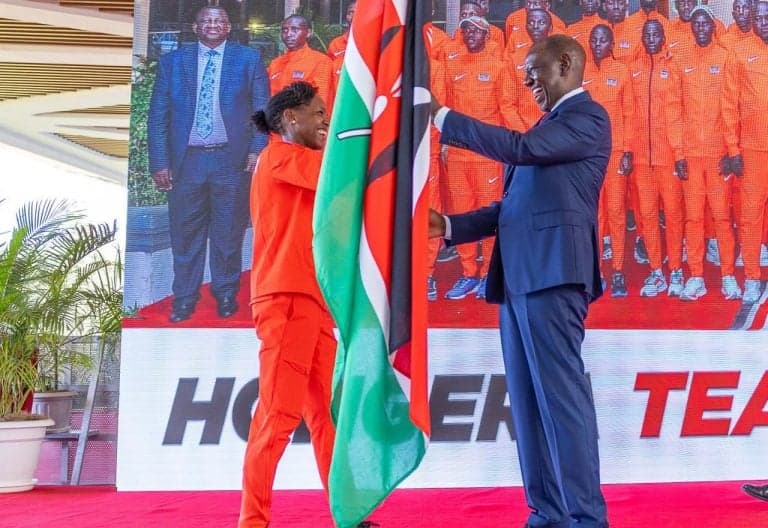We're loading the full news article for you. This includes the article content, images, author information, and related articles.
President William Ruto today awarded Kenyan athletes KSh 37 million for their performance at the 2025 World Athletics Championships in Tokyo, marking the first implementation of a new reward scheme. The initiative aims to boost athlete morale and recognise their contributions to national prestige.

Nairobi, Kenya – President William Ruto on Thursday, October 2, 2025, hosted Kenya's triumphant athletes from the 2025 World Athletics Championships in Tokyo, presenting them with KSh 37 million in prize money at State House. This event marked the inaugural implementation of the government's enhanced sports reward scheme, a move lauded by athletes and sports enthusiasts alike.
The ceremony saw gold medallists receive KSh 3 million each, silver medallists KSh 2 million, and bronze medallists KSh 1 million. The total payout underscores the government's commitment to incentivising athletic excellence and acknowledging the rigorous training and dedication of Kenyan sports personalities.
Faith Kipyegon, who secured her fourth world 1500m title in Tokyo, led the contingent of celebrated athletes. Her outstanding performance was among those recognised, highlighting Kenya's continued dominance in middle and long-distance running on the global stage.
The new reward programme was first unveiled by President Ruto on September 3, 2025, when he flagged off the Tokyo-bound team. During the announcement, the President emphasised that the scheme's primary objective was to motivate Kenyan athletes and acknowledge the immense sacrifices they make to represent the nation. This initiative replaces previous ad-hoc reward systems, aiming for a more structured and predictable approach to athlete compensation.
Historically, discussions around athlete welfare and consistent reward systems have been prominent in Kenyan sports circles. The implementation of this new scheme addresses long-standing calls from athletes and sports federations for better recognition and financial support, aligning Kenya with global best practices in athlete remuneration.
The new reward scheme is expected to influence public debate on sports policy and funding. Stakeholders, including sports federations, athletes' representatives, and parliamentary committees, are keen on understanding the long-term sustainability, funding mechanisms, and transparency of the programme. There is a general consensus that while the initiative is commendable, clarity on its timelines, overall costs, and safeguards against potential misuse of funds is crucial for its sustained success.
Sports analysts suggest that a well-managed reward system could significantly boost Kenya's performance in future international competitions, attracting more talent to professional sports and ensuring athletes can focus on their training without undue financial strain. The scheme is also seen as a potential catalyst for increased investment in sports infrastructure and grassroots development.
While the new reward scheme is largely positive, potential risks include the need for consistent funding, which could be subject to economic fluctuations or shifts in government priorities. There are also concerns about equitable distribution across all sports disciplines, not just athletics, to foster holistic sports development in Kenya. Ensuring transparency in the selection of beneficiaries and the disbursement process will be vital to maintain trust and prevent any perception of favouritism.
Details regarding the long-term funding model for the reward scheme, including specific budgetary allocations beyond the current financial year, remain largely unknown. Further clarity is also awaited on whether the scheme will be expanded to include other international sporting events or categories of athletes, such as those with disabilities, and how it will integrate with existing athlete support programmes.
Future developments to watch include the formalisation of the reward scheme into a sustainable policy, potential expansion to other sports, and the establishment of clear administrative guidelines for its implementation. Public and parliamentary discussions on the scheme's long-term financial viability and its impact on overall sports development in Kenya will also be key.
This initiative builds on previous government efforts to support sports, including investments in training facilities and athlete welfare programmes. It also aligns with broader national strategies to leverage sports for national branding and youth empowerment.
Keep the conversation in one place—threads here stay linked to the story and in the forums.
Sign in to start a discussion
Start a conversation about this story and keep it linked here.
Other hot threads
E-sports and Gaming Community in Kenya
Active 9 months ago
The Role of Technology in Modern Agriculture (AgriTech)
Active 9 months ago
Popular Recreational Activities Across Counties
Active 9 months ago
Investing in Youth Sports Development Programs
Active 9 months ago
Key figures and persons of interest featured in this article